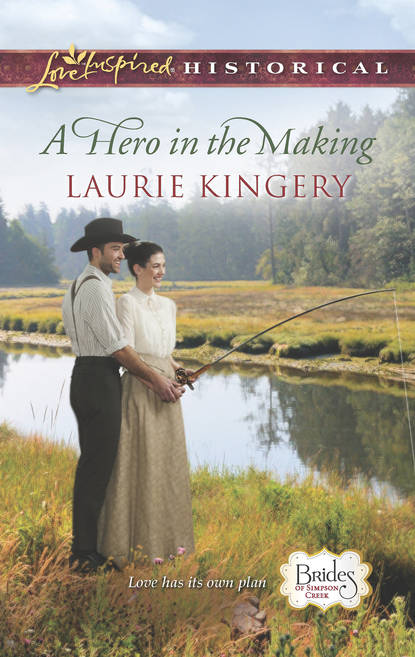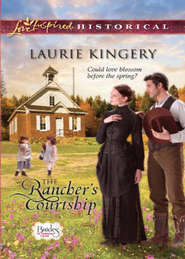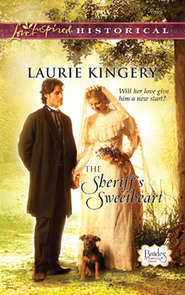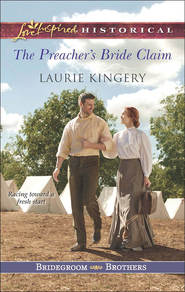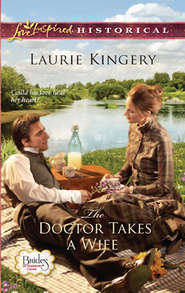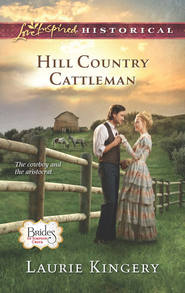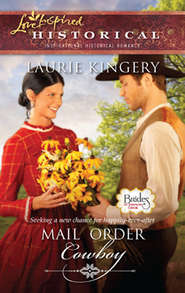По всем вопросам обращайтесь на: info@litportal.ru
(©) 2003-2025.
✖
A Hero in the Making
Настройки чтения
Размер шрифта
Высота строк
Поля
“Morning,” she said. “No, I’ve got them, but it would help if you would open the door to the café for me.”
When he had let her into the café, she turned to him. “Give me a few minutes, and you can have your breakfast, Mr. Bohannan.”
She was back to formality, he noted. “That would be very nice, Miss Ella. I wasn’t sure if ‘board’ included breakfast or not.” He wasn’t about to tell her that George’s mother had insisted he take a half-dozen leftover biscuits with him when he’d departed from the Detwiler house last night, and that he’d already devoured a couple of them this morning.
He waited until the smells of bacon frying and biscuits baking wafted into the saloon, and returned to the café, taking a chair at one of the tables. While he waited, he watched her efficient movements as she cracked and scrambled the eggs and poured them into a waiting skillet, then set up the plates and silverware for easy serving. He noticed she had brought a towel-wrapped stack of tortillas also.
“For the travelers and cowboys who pass who want something they can take with them and eat on the road,” she explained, following his gaze. Then she dished up a generous helping of bacon, eggs and biscuits, and placed them in front of him, along with a small jar of preserves.
“Thank you, Miss Ella. It smells delicious.” He dipped his fork into the fluffy eggs, and found that his nose hadn’t deceived him. Silence descended as she stared out the window at the street behind the saloon.
“I...I hope you slept well last night, in spite of all that happened yesterday,” he said, determined to penetrate her coolness.
Her reply was crisp. “As well as could be expected, under the circumstances.”
They heard footsteps coming through the saloon and Detwiler appeared, and Ella dished out food for him, too.
“Mornin’, Miss Ella. Ma said it did her heart good to watch you eat last night, Nate,” George said with a chuckle.
Nate had been hoping George wouldn’t mention his supper at the Detwilers’ in front of Ella. It made him look as if he were going from person to person, mooching meals. He darted a quick glance at her, and sure enough, one eyebrow was raised as she poured George coffee. “It was mighty nice of her to invite me,” he told George. “Please thank her again.”
And then customers started showing up, and Ella got busy serving them, and she didn’t appear to notice when Nate left to go to the lumber mill.
He found the mill past the school, nestled on the creek bank, just as Detwiler had said it would be, and located its proprietor, Hank Dayton, as dour and paunchy a man as the saloonkeeper had predicted.
“You’ll be Bohannan from the saloon, needin’ some two-by-twos and the use of the lathe. Sheriff told me you were comin’,” Dayton said as if his customer’s presence was something distasteful to be dealt with as soon as possible so he could be alone again. “You know how many you need, and how long to cut ’em?”
“Thirty-two, thirty inches long, just like this one,” Nate said, holding out one table leg that had miraculously escaped the carnage. He was glad he’d done his figuring beforehand, for it didn’t seem the taciturn Dayton had much patience. Twelve of the table legs were for Ella’s tables, the rest for the saloon’s. “And I’ll need some planks I can trim and join into five sixty-inch round tabletops and four chair seats, but I’ll work on the legs first.”
Dayton just grunted, wiped his hands on his heavy canvas apron and motioned Bohannan to follow him. “You might as well help me saw until you’ve got enough to start with.”
Within the hour, Nate was hard at work in a little room off to the side of the main mill building, sanding lengths of wood and angling them at the end that would contact the floor so that the tables wouldn’t wobble. He was rusty at first, having used his silver tongue much more of late than he’d used his hands, but before long he discovered a remembered pleasure in turning the wood from rough two-by-twos into smooth pieces fit for table legs.
The tables in the saloon, of course, would be fairly plain and utilitarian—the customers wouldn’t care how ornate the table legs were so long as their cards and bottles stayed steady on the tabletop. He was able to fashion those fairly quickly, he discovered, as his hands rediscovered a long-unused skill with the lathe. He thought he might spend a little more time on the tables and chairs he made for the café. The ones Ella had had that day he’d come in and bought the sandwiches had been as plain as those in the saloon—in fact, they probably had been borrowed from there—but the ones on loan from the preacher’s wife were full of fancy swirls and spindles and feet like talons clutching balls. Ladies, he knew, liked fancy details.
He imagined presenting Ella with new tables and chair legs that were curved and tapered—cabriole legs, his father had called them. Did his hands still possess enough talent to make such things? And what will she say if I do? As he worked, he imagined various ways she might react, then wondered why it mattered to him. He’d be riding on as soon as he’d finished the job, after all.
Nate worked steadily through the day, forgetting to go to the café for his meal at noon and ignoring his back’s protest at the long hours bent over the lathe, until he had finished most of the table and chair legs for the saloon. He was startled, therefore, when Dayton wheeled in a low cart laden with planking for him to shape and join into tabletops, and informed him he was ready to lock up and go home for supper.
“Reckon I’ll see you tomorrow, then,” Nate told him. He would have asked if he could return after supper to work some more if he thought Dayton would trust him in the mill alone, but the man didn’t seem like the trusting sort.
“Nope, you won’t. Tomorrow’s Sunday, and the mill’s closed. Reckon you might meet my missus at church, if you’re a churchgoin’ man—she’ll be there with the young’uns, but once she gets those squallin’ brats outta the house, that’s my time to get some extra shut-eye,” Dayton announced proudly, as if avoiding church was a virtue.
Tomorrow is Sunday? Nate was surprised once again. He and Salali had kept track of Sundays only to avoid staging medicine shows on that day, for conducting business on the Sabbath was apt to offend decent folks. He couldn’t think when he’d last darkened the door of a church.
But if he didn’t attend church, what would he do with himself all morning?
Nate figured the noise from the saloon would keep him awake for a while tonight. He wasn’t sure how long Detwiler kept his establishment open—it probably depended on the thirst of the clientele on any given evening. Tonight the drinkers and gamblers would no doubt be celebrating the reopening of the saloon. And since it was Saturday, there’d be cowboys in from the ranches enjoying time away from their chores.
No matter how late he went to bed, though, his lids just naturally tended to fly open at dawn. He wasn’t one to lie abed like the lumber mill owner.
Did Ella attend church? Did she ever let herself rest that much, or would she be serving breakfast, then dinner, to travelers passing through town? If she was a churchgoing woman, what would she say if he were to show up there?
It might go a long way to allay her suspicion of him, to see him warming a pew.
On the other hand, though, would the Lord think him a hypocrite, going to church after living a lie for so long?
* * *
Ella just happened to be bringing Detwiler’s supper in to him in the saloon—a favor she did so he could continue to be available to any early-evening customers—when Bohannan entered carrying a tied stack of newly turned table and chair legs with him over one shoulder as if he were a conqueror laden with booty. She noted he also carried a brown-paper–wrapped parcel as if he’d made a stop at the mercantile.
Detwiler whistled. “You’ve been busy,” he said admiringly.
Bohannan grinned. “That I have. I’ll take them back with me in the morning since I’ll need to join them to the tabletops and chair seats when those are done, but I thought I’d make sure you approve of how I’m doing them before they’re varnished.”
As if Bohannan thought there was anything to disapprove of, Ella thought waspishly, seeing the saloonkeeper run a hand over the even, sanded surfaces of a couple of chair legs.
“Whoo-ee, these are smooth as a baby’s—” Detwiler darted a hasty glance at Ella “—um, cheek. The only problem with these is they’re too good for my customers,” he added with a chuckle, keeping his voice low so it didn’t carry to a couple of cowboys lounging at one of the long tables.
Ella managed to stifle an unladylike snort at the fulsome compliments, but she could see that Bohannan had done quality work.
“Dare I hope there’s some of that for me?” Bohannan asked, with a nod toward the plate of roast beef and mashed potatoes she was still holding.
Ella set it down on the bar. “You should have had to eat the cold chicken I kept by for you at noontime,” she told him tartly. “But you never showed up. I finally ate it myself.”
He had the grace to look abashed. “I’m sorry about that, Miss Ella. I got caught up in what I was doing, once I got started at the lathe. Next time, I’ll either come back at noon, or maybe take some extra breakfast with me, all right?”
Who could stay irritated at a man who could smile like that? His smile seemed to know the path straight to her heart, unfortunately for her.
“Come on back to the café after you wash up,” she said, turning on her heel. Over her shoulder, she added, “By the way, you might want to rinse the sawdust out of your hair while you’re at it.”
* * *
Ten minutes later, freshly shaved, his damp hair curling, he entered the café and sat down at one of the tables. He was wearing a new white shirt, she noted, one that looked like the ready-made ones sold at the mercantile, along with the silver brocade vest he’d had on the first day he came to town. The shirt was what had been in the package he’d been carrying, she realized, remembering that Salali had robbed him of everything but the clothes he’d been wearing. She thought he must have sweet-talked Mrs. Patterson into advancing him the cost of it, since he’d said the medicine-show man had picked his pockets, too.
Вы ознакомились с фрагментом книги.
Приобретайте полный текст книги у нашего партнера:
Приобретайте полный текст книги у нашего партнера:





